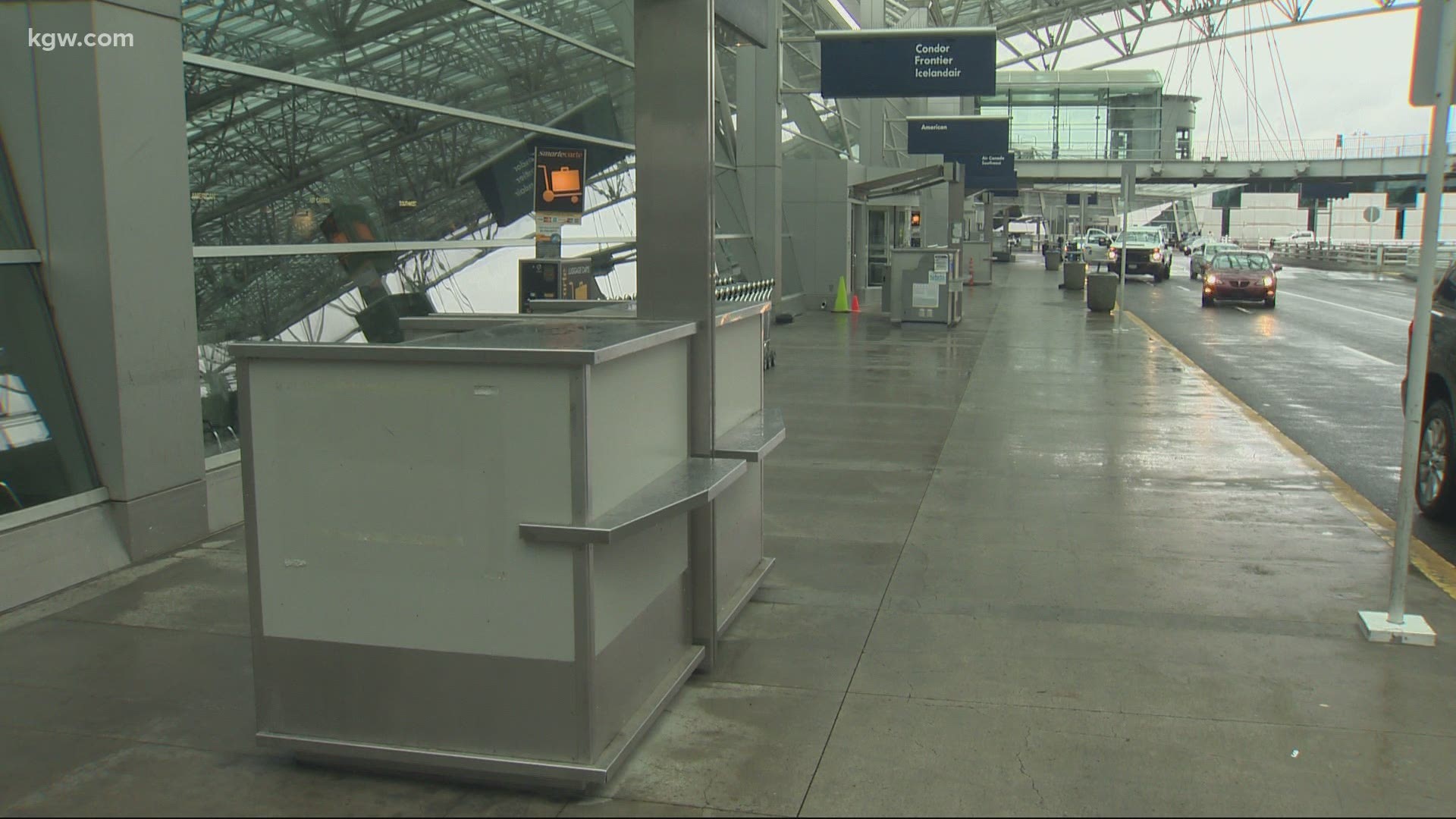PORTLAND, Ore. — The government’s top public health agency is raising the importance of wearing face masks on planes, trains and buses, although the Trump administration has resisted making masks mandatory for travelers.
The Centers for Disease Control and Prevention issued new interim guidelines for travelers late last month, including a “strong recommendation” to wear face coverings to slow the spread of COVID-19.
Meanwhile, with COVID-19 numbers up in Oregon and across the country, a spokesperson at Portland International Airport (PDX) said travel is expected to be way down this year. Many travelers are waiting until the last minute to decide whether to change their plans.
“A really important thing to remember right now is that it is so dynamic and the projections we have for the Thanksgiving holiday were pulled together prior to what we're seeing," said Kama Simonds.
She said last year, from the Friday before Thanksgiving to the Monday after, the airport saw more than 500,000 travelers and on the busiest days they saw up to 56,000 travelers. This year she’s expecting about a 65% decrease in numbers.
"We're expecting to see 200,000 travelers over that 10-day period, and the busiest of those days is Sunday, Nov. 29," she said.
Travelers at PDX on Friday were making sure safety guidelines were in place before they board their flights. There are signs all over the airport, reminding people that masks are required.
The Centers for Disease Control and Prevention said its advice on masks should be followed by passengers and workers on planes, ferries, trains, subways, buses, taxis and ride-sharing vehicles, including in airports and at subway and bus stations.
“Transmission of the virus through travel has led to interstate and international spread of the virus,” the CDC said in a statement. “Local transmission can grow quickly into interstate and international transmission when infected persons travel on public conveyances without wearing a mask and with others who are not wearing masks.”
Simonds said she expects more than ever before for holiday travelers to make last-minute decisions on whether they board their flights or not.
“People's travel habits are very different now," Simonds said. "They're making plans later, or they make plans and change plans.”
Travelers are often in close contact with others, sometimes for several hours, raising the risk of contracting or spreading the virus that causes COVID-19. Masks are necessary because travelers might not be able to keep six feet apart from others on planes and buses, CDC said.
All leading U.S. airlines require passengers other than small children to wear masks during flights, but enforcement can be spotty. The Federal Aviation Administration has declined to require masks, passing over requests by airline labor groups and some Democratic lawmakers. Instead, the Transportation Department and other agencies issued health guidelines in July that left mask requirements and enforcement to individual airlines.
Quick tips from the CDC
Wash your hands often with soap and water for at least 20 seconds. The CDC says this should be done after you have been in a public place or after blowing your nose, coughing or sneezing. If soap and water aren't available, hand sanitizer that contains at least 60% alcohol will work just as well.
The CDC encourages everyone to continue wearing cloth masks in public and to continue practicing social distancing. It recommends everyone to maintain a distance of at least 6 feet or more from people you don’t live with.
If you think you have been exposed, you should take extra precautions like staying home as much as possible for 14 days, avoiding being around other people and considering getting tested for the coronavirus.
Holiday gatherings
If you are traveling across the country for the Thanksgiving, or even if you're just taking a short trip to a neighbor or family member's home, the CDC offered several guidelines for holiday gatherings.
The first step to help reduce the spread of the virus is to "assess current COVID-19 levels in your community to determine whether to postpone, cancel, or limit the number of attendees," the CDC said.
Health officials recommend celebrating virtually or only with family members, which poses only a low risk of spreading the virus. People who shouldn't attend a Thanksgiving gathering at all this year include those exposed to the coronavirus and people who have an increased risk for severe illness. The CDC explains that large gatherings of families and friends, crowded parties and travel may put people at increased risk for COVID-19.
If someone is hosting a Thanksgiving gathering, even amid the virus, the CDC asks that people consider the following steps to keep everyone safe:
- Host outdoor activities rather than indoor activities
- Try and limit guests to just people in the local area
- Limit the number of guests as much as possible
- Encourage guests to wear masks and use hand sanitizer
- Ask guests to "strictly avoid contact with people outside of their households for 14 days before the gathering"
If someone develops COVID-19 symptoms or tests positive after a gathering, they should immediately contact the host and others that attended the event.

